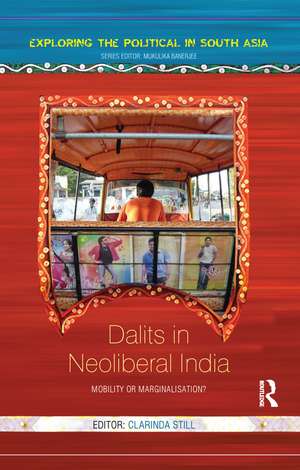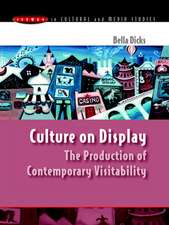Dalits in Neoliberal India: Mobility or Marginalisation?: Exploring the Political in South Asia
Editat de Clarinda Stillen Limba Engleză Paperback – 14 iun 2019
| Toate formatele și edițiile | Preț | Express |
|---|---|---|
| Paperback (1) | 384.77 lei 6-8 săpt. | |
| Taylor & Francis – 14 iun 2019 | 384.77 lei 6-8 săpt. | |
| Hardback (1) | 1163.66 lei 6-8 săpt. | |
| Taylor & Francis – 8 aug 2014 | 1163.66 lei 6-8 săpt. |
Preț: 384.77 lei
Nou
Puncte Express: 577
Preț estimativ în valută:
73.62€ • 76.88$ • 60.80£
73.62€ • 76.88$ • 60.80£
Carte tipărită la comandă
Livrare economică 15-29 aprilie
Preluare comenzi: 021 569.72.76
Specificații
ISBN-13: 9780367176839
ISBN-10: 0367176831
Pagini: 292
Dimensiuni: 138 x 216 mm
Greutate: 0.34 kg
Ediția:1
Editura: Taylor & Francis
Colecția Routledge India
Seria Exploring the Political in South Asia
Locul publicării:Oxford, United Kingdom
ISBN-10: 0367176831
Pagini: 292
Dimensiuni: 138 x 216 mm
Greutate: 0.34 kg
Ediția:1
Editura: Taylor & Francis
Colecția Routledge India
Seria Exploring the Political in South Asia
Locul publicării:Oxford, United Kingdom
Public țintă
PostgraduateCuprins
Maps, Figures and Plates. Tables. Abbreviations. Foreword Mukulika Banerjee. Acknowledgements. Dalits in Neoliberal India: An Overview Clarinda Still 1. Dalit Entrepreneurs, Globalisation and the Supplier Diversity Experiment in Madhya Pradesh Sudha Pai 2. Trajectories of Dalits Incorporation into the Indian Neoliberal Business Economy Kaushal K. Vidyarthee 3. Locating Caste in a Globalising Indian City: A Study of Dalit Ex-millworkers Occupational Choices in Post-industrial Mumbai Sumeet Mhaskar 4. Legislating for Liberation? Dalit Electoral Politics and Social Change in Tamil Nadu Hugo Gorringe 5. A Book Also Travels: Circulating Small Booklets in Dalit Poorva Badri Narayan 6. Low Caste Elites and Re-traditionalised Responses: Status and Security in an Economically Uncertain Time Jordan C. R. Mullard 7. Dalit Women Becoming Housewives : Lessons from the Tiruppur Region, 1981 82 to 2008 09 Judith Heyer 8. Finding One‘s Place among the Elite: How Dalits Experiencing Sharp Upward Social Mobility Adjust to Their New Social Status Jules Naudet. About the Editor. Notes on Contributors. Index.
Recenzii
‘This volume takes a fresh look at one of the key debates on caste in contemporary India: whether Dalits are finally unshackling the stranglehold of economic marginalisation, discrimination and stigma, and straddling new opportunities for upward mobility, as the Indian economy liberalises.’ — Ashwini Deshpande, Professor of Economics, Delhi School of Economics
‘[A] book about the contemporary realities of caste, the dynamics of change and its persistence, the messy realities of prejudice, exclusion and deprivation along with positive stories of mobility, social movements and deepening democracy in today’s India.’ — Surinder S. Jodhka, Professor of Sociology, Jawaharlal Nehru University
‘Offers a wide-ranging and incisive analysis of the condition of India’s Dalits ... thoughtful, rich, and beautifully observed — a wonderful resource for South Asianists and development scholars.’ — Craig Jeffrey, Professor of Development Geography, University of Oxford
‘[A] book about the contemporary realities of caste, the dynamics of change and its persistence, the messy realities of prejudice, exclusion and deprivation along with positive stories of mobility, social movements and deepening democracy in today’s India.’ — Surinder S. Jodhka, Professor of Sociology, Jawaharlal Nehru University
‘Offers a wide-ranging and incisive analysis of the condition of India’s Dalits ... thoughtful, rich, and beautifully observed — a wonderful resource for South Asianists and development scholars.’ — Craig Jeffrey, Professor of Development Geography, University of Oxford
Notă biografică
Clarinda Still is Lecturer of Modern Indian Studies, University of Oxford; and Junior Research Fellow, Wolfson College.
Descriere
This volume deals with the mobility and marginalisation experienced by Dalits in India. It highlights the contradictions and disjunctures they face, resulting in simultaneous improvement and deterioration of their status in society. It discusses their rise and progress along with continuing exploitation and oppression, as well as their polarisation in terms of class, education, economic position, caste, identity, and political interests.




















